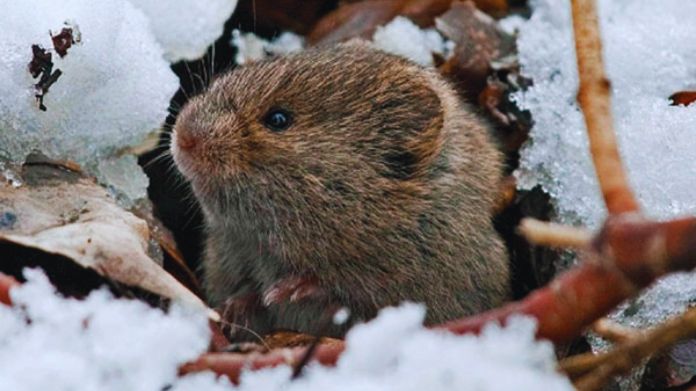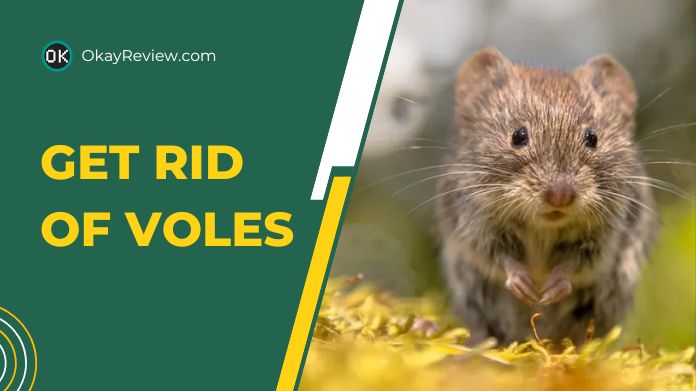Welcome, garden lovers! Are you spotting unwanted visitors in your yard? You’re not alone. These small critters can cause big problems for your plants and landscape. But don’t worry, help is here!
This guide will show you how to get rid of voles using simple, effective methods. Whether you’re a seasoned gardener or a first-time homeowner, these tips will help you reclaim your outdoor space.
Let’s dive into safe, humane ways to say goodbye to voles and hello to a beautiful, healthy yard and garden.
Table of Contents
What Are Voles? What Are the Signs You Have Voles?
Voles, also known as field mice or meadow mice, are small rodents with a stout body, short legs, and a short tail.
They are primarily herbivores, feasting on a variety of garden plants, grasses, and bulbs. Signs of voles include snake-like tunnels across your lawn, chewed plant roots, and gnawed stems and leaves.
If you notice these indicators, it’s time to take action and learn how to get rid of voles.
What Attracts Voles to Your Yard?
Voles are attracted to your yard for several reasons, primarily due to the availability of food, shelter, and nesting materials, but how to get rid of voles?
Here’s what makes your garden an inviting home for these small rodents:
- Dense Vegetation and Ground Cover: Voles seek out areas with dense vegetation, such as long grass, shrubbery, and ground cover, for protection from predators. These areas provide excellent hiding spots and nesting sites, making your lush garden a perfect habitat for them.
- Food Sources: Voles are primarily herbivores and are drawn to gardens that offer a plentiful supply of their favourite foods. They feed on a variety of garden plants, grasses, bulbs, roots, and seeds. Gardens with a rich supply of root vegetables, flower bulbs, and abundant plant life can be particularly attractive to voles.
- Moisture: Voles prefer living in moist environments as they provide the necessary hydration and also support a wide variety of plant life for them to feed on. Yards with high moisture levels, such as those with mulch, compost piles, or near water sources like ponds or streams, can attract voles.
- Debris and Clutter: Piles of wood, garden tools, leaves, or other debris can offer voles shelter and material for building their nests. A cluttered yard with plenty of hiding places is more likely to attract voles than a clean, well-maintained one.
- Protection from Predators: Voles are prey for many animals, so they are constantly seeking safe habitats. Dense vegetation, tall grasses, and clutter provide cover from birds of prey, cats, dogs, and other predators, making your yard a safer place for voles to live and reproduce.
These are some key things that attract voles to your yard. Now it’s time to come towards “How to get rid of voles?”
How to Get Rid of Voles?
 Dealing with voles can be a real headache, right? These little critters can turn your beautiful garden into their personal playground if you’re not careful.
Dealing with voles can be a real headache, right? These little critters can turn your beautiful garden into their personal playground if you’re not careful.
But don’t worry, I’ve been there, and I’m here to share some tried-and-true methods to send them packing.
Let’s get your garden back by knowing how to get rid of voles.
- Reduce Habitat: Think of voles like unwanted house guests who love a messy room. Start by tidying up: mow the lawn, yank out those weeds, and clear the clutter. Get rid of that pile of leaves or the old wood stack where they love to hide. And here’s a little trick: pull your mulch back from the base of your trees; it’s like taking away their favourite snack.
- Invite the Predators: Nature has a way of balancing things out. Owls, hawks, and even your furry feline friend can be allies in your quest against voles. Setting up an owl box is like opening a small, quaint Airbnb for feathered hunters who love to snack on voles. And your cat? Well, giving them more outdoor time might just make them the hero of your garden saga.
- Trapping: If you’re anything like me, you prefer showing pests the door without harsh measures. Live traps are your go-to here. Place them near the vole highways or burrow entrances – yeah, voles have their little paths, just like us. Bait them with something tempting, like peanut butter or a slice of apple. Remember to check them often – we’re being humane, after all.
- Natural Repellents: Before reaching for chemicals, why not try something more natural? Castor oil, garlic, and even spicy capsaicin can keep those voles at bay. It’s like telling them your garden just isn’t their taste. But remember, nature’s remedies wash away with rain, so you’ll need to reapply after a downpour.
- Exclusion: Protect your prized plants like they’re precious jewels. A bit of hardware cloth or fine mesh can act as a barrier, like a castle moat, keeping those voracious voles from reaching your plant roots. And tree guards? They’re like armour for your trees’ tender bark.
- Soil Grading and Drainage: Voles are like those guests who only come when there’s a pool party. If your garden is less of a splash zone and more on the dry side, they’ll move on to the next watering hole. Fill in their tunnels, improve the yard drainage, and you’ll notice fewer vole RSVPs to the garden party.
- Poison Baits: I get it; sometimes you have to pull out all the stops. But let’s keep it safe, especially if kids and pets are around. Go for vole-specific products and stick to the guidelines like they’re your garden’s rulebook. Or better yet, let a pro handle it if you’re unsure.
- Cultural Practices: Voles love easy pickings, like that all-you-can-eat buffet of fallen fruits and overwatered gardens. Plant some vole-resistant flora – think of them as the food that stays untouched at the party. Keep your garden tidy and less like a vole’s dream dinner.
Wrap Up!
While voles can be a frustrating garden pest, understanding their habits and preferences allows you to implement effective strategies to get rid of voles. Regular monitoring and maintenance of your garden and yard can help prevent future infestations and keep your outdoor spaces healthy and beautiful.


I appreciate the detailed explanation of different methods, from natural remedies to professional solutions. Your practical tips and clear instructions make tackling a vole problem much less daunting.